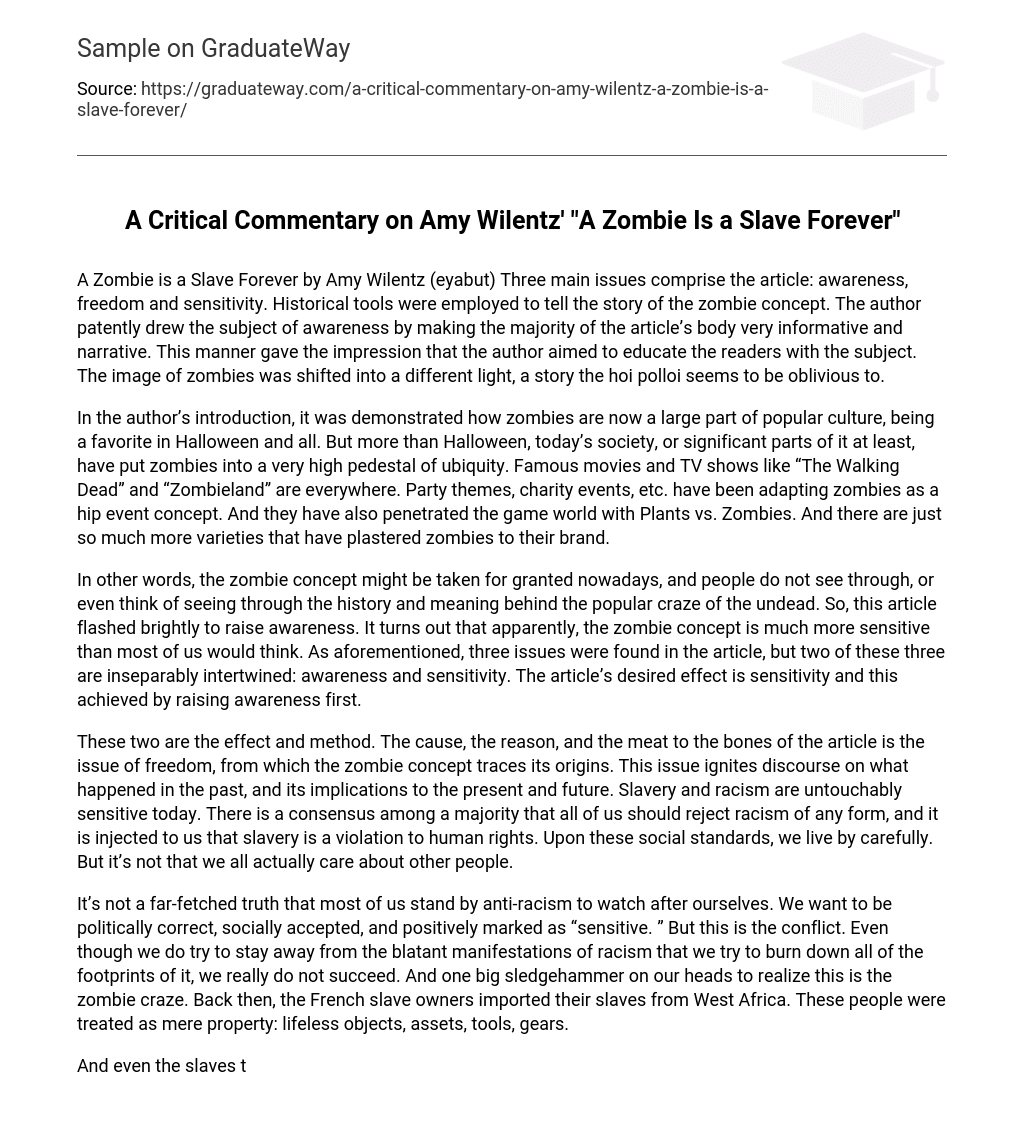A Zombie is a Slave Forever by Amy Wilentz (eyabut) Three main issues comprise the article: awareness, freedom and sensitivity. Historical tools were employed to tell the story of the zombie concept. The author patently drew the subject of awareness by making the majority of the article’s body very informative and narrative. This manner gave the impression that the author aimed to educate the readers with the subject. The image of zombies was shifted into a different light, a story the hoi polloi seems to be oblivious to.
In the author’s introduction, it was demonstrated how zombies are now a large part of popular culture, being a favorite in Halloween and all. But more than Halloween, today’s society, or significant parts of it at least, have put zombies into a very high pedestal of ubiquity. Famous movies and TV shows like “The Walking Dead” and “Zombieland” are everywhere. Party themes, charity events, etc. have been adapting zombies as a hip event concept. And they have also penetrated the game world with Plants vs. Zombies. And there are just so much more varieties that have plastered zombies to their brand.
In other words, the zombie concept might be taken for granted nowadays, and people do not see through, or even think of seeing through the history and meaning behind the popular craze of the undead. So, this article flashed brightly to raise awareness. It turns out that apparently, the zombie concept is much more sensitive than most of us would think. As aforementioned, three issues were found in the article, but two of these three are inseparably intertwined: awareness and sensitivity. The article’s desired effect is sensitivity and this achieved by raising awareness first.
These two are the effect and method. The cause, the reason, and the meat to the bones of the article is the issue of freedom, from which the zombie concept traces its origins. This issue ignites discourse on what happened in the past, and its implications to the present and future. Slavery and racism are untouchably sensitive today. There is a consensus among a majority that all of us should reject racism of any form, and it is injected to us that slavery is a violation to human rights. Upon these social standards, we live by carefully. But it’s not that we all actually care about other people.
It’s not a far-fetched truth that most of us stand by anti-racism to watch after ourselves. We want to be politically correct, socially accepted, and positively marked as “sensitive. ” But this is the conflict. Even though we do try to stay away from the blatant manifestations of racism that we try to burn down all of the footprints of it, we really do not succeed. And one big sledgehammer on our heads to realize this is the zombie craze. Back then, the French slave owners imported their slaves from West Africa. These people were treated as mere property: lifeless objects, assets, tools, gears.
And even the slaves themselves believe this. This traces back to a lot of ideologies, but the largest is Rudyard Kipling’s “White Man’s Burden. ” That ideology somehow meant well, amidst its insensitivity and unashamed discrimination, but it might have been because of that ideology that the European Caucasians treated people of color at a level abysmally lower than theirs. They were treated like animals, beasts of burden, maybe even worse—worse, because of the fact that these people have the solid capability to communicate with each other, to speak and stand up for themselves.
But they were robbed of that possibility because of the many forms of abuse the slave owners used against them, in this case, the slave owners went to as far as the slaves’ faith. The slaves were in murderous shackles, they did not own their bodies. Their masters owned them wholly and the only thing they could do in protest is to end their lives. Suicide was the only way they could practice bodily autonomy. The slave owners did not even want them to have children because, according to them, they are a waste of resources and aren’t of any use until they are of age ten or so.
They thought it would be more economical to just import more slaves from West Africa than to let the slave in the colony to reproduce. This just shows how people back then can just instantly flee from the state of humanity. But how far have we come from then? It is amazing how the world of today is much more sensitive to the idea of being united as humans on the surface. But within the deep works of humanity, this slavery and discrimination still exists. And one instance of its existence is manifested by our noteworthy zeal towards zombies. It’s not that we support slavery because we support zombies. It’s our ignorance that’s the bane.
We have chosen to ignore the bloody history behind our pop culture, and this implies that we can still be as inhumane as we were centuries ago. Because the abhorrent behavior the conquistadors exhibited also traces back to ignorance. The whites then ignored the possibility that their slaves were human as much as they were. Sensitivity is the effect of this article. The author enlightens the readers to dig deeper on things that are quite accepted in today’s pop culture. It reminds that most of the worst things in our history are rooted upon ignorance, and that we shouldn’t delve onto that sordid choice if we want peace to prevail.





